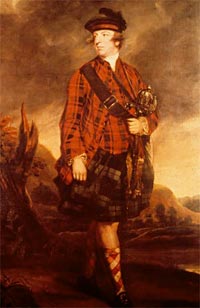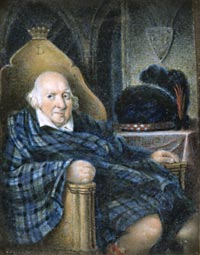Page content
Lord Dunmore, John Murray
Fourth Earl of Dunmore

Courtesy of the Virginia Historical Society, Richmond, VA.
John Murray, earl of Dunmore by Charles Harris.
- Born to Scottish nobility in 1730
- Becomes Virginia’s last royal Governor in 1770
- Early popularity wanes under radical policy decisions
- Dies in 1809
Born into aristocracy
Born at Taymouth, Scotland, in 1730, John Murray was the eldest son of William and Catherine Murray and nephew of John Murray, second Earl of Dunmore. In 1745, William Murray and his young son John joined the ill-fated campaign of Charles Edward Stuart, "Bonnie Prince Charlie."
After the campaign was defeated at Culloden, the Murray family was put under house arrest, and William was imprisoned in the Tower of London. By 1750, William had received a conditional pardon. His son John, now twenty years old, joined the British Army. In 1756, after the deaths of his uncle and father, John became the fourth Earl of Dunmore.
Governor of Virginia
Having left the Army, the young Earl became active in politics and was rewarded with the governorship of New York. In 1770, Virginia's governor died, and Dunmore was named to replace him. In his new post, he promoted the opening of western lands and led a successful military expedition against the Shawnee Indians.
In 1774, Dunmore’s wife, Charlotte, and six of their seven children made the crossing from Scotland to America to join their husband and father in Williamsburg. Within the year, another child, Virginia, was born. The Governor's Palace was the family's official residence, but Dunmore had earlier purchased a private plantation, Porto Bello, not far outside Williamsburg.
Controversies in office
The Gunpowder Incident of April 1775 marked a dramatic change in Lord Dunmore's political fortunes. His unpopularity forced him to abandon the Palace and seek safety with his family on a British ship. The family soon returned to Scotland, while Lord Dunmore gathered naval and loyalist forces to fight the rebellious colonists.
On November 7, 1775, he issued a proclamation that shocked Virginians, offering freedom to slaves and indentured servants who would leave their masters to fight with the British.
Departure from the colonies
Soon, the governor without a domain returned to England and to his seat in the House of Lords. Among the items he took with him was a pair of pistols, now owned by Colonial Williamsburg.
Lord Dunmore continued to be active in politics, serving as Governor of the Bahama Islands from 1786 until 1795. He died February 25, 1809, and was buried at the Church of St. Lawrence in Ramsgate, Kent.
For further reading:

